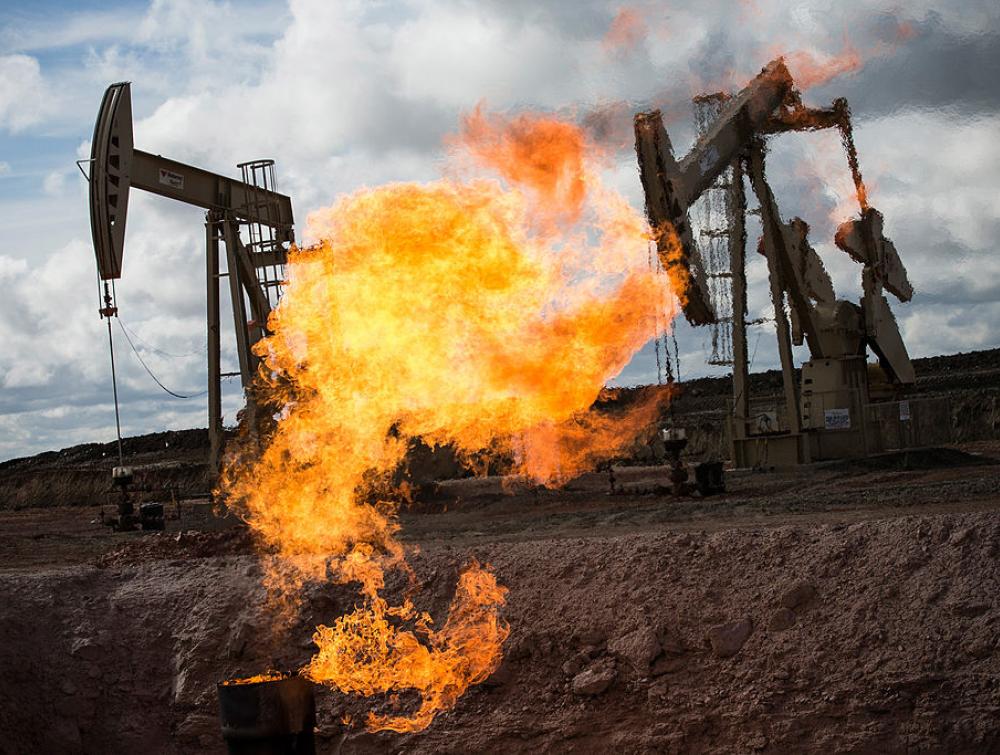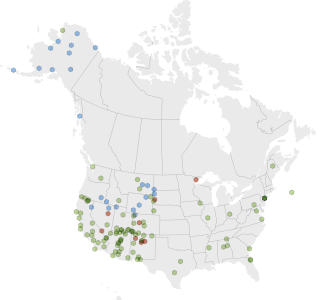5 reasons Trump’s fossil fuels agenda is dangerous

Andrew Burton/Getty Images
Trump’s fossil fuel agenda threatens public lands, health and climate; will not bring costs down
Trump is barely two months into his presidency, but his push of a reckless, profit-centric fossil fuel agenda already seriously threatens communities, public lands and the climate. On his first day, President Trump declared a “national energy emergency”—a pretext for expanding unnecessary drilling across public lands and waters even as oil and gas production on public lands hits record highs!
Fossil fuel development on public lands and waters is responsible for nearly one-quarter of all U.S. greenhouse gas emissions. But there’s been progress in tackling this: the Biden administration put policies in place that were set to cut emissions from Bureau of Land Management (BLM) leases for oil, gas and coal development by nearly 40%.
And now, we are going backwards. Within the flurry of executive orders signed in January were actions to block wind and solar energy development on public lands, rescind critical environmental protections, weaken safeguards for clean water and roll back regulations to hold polluters accountable.
Despite claims that this agenda will lower energy prices, it will actually deepen our dependence on fossil fuels at the expense of public lands, communities and the climate. Here are five reasons why Trump’s fossil fuel push is dangerous, misguided and bad for the country:
1. Oil and gas companies already have more land than they are using!
Despite claims that the U.S. needs to expand drilling on public lands, oil and gas production from public lands is already at an all-time high! Currently, 81% of BLM lands in the West are available to oil and gas leasing. What’s more, companies currently hold 35 million acres of federal leases for oil and gas extraction, yet they only produce on a little more than half of those acres. In other words, the industry already has vast amounts of lands leased for drilling but isn't using all of it.
Companies drill when it’s profitable, not just when they have access to more land. This is supply and demand: if oil prices are high, drilling becomes more profitable and companies invest in projects; if oil prices are low, companies stop drilling because it’s not worth the cost.
However, this doesn’t stop oil and gas companies from bidding on available public lands, even if lands have a low potential for oil and gas. As of 2023, a whopping 46% of BLM lands leased to the oil and gas industry are nonproducing. When the oil and gas industry sits on leases they don’t intend to develop, it hamstrings land managers from applying other uses to these lands like outdoor recreation, wildlife conservation or responsible renewable energy development.

Cherokee Generating Station in Colorado
Mason Cummings, TWS
2. More drilling won’t lower energy prices
President Trump claims his ‘drill, baby, drill’ approach will lower energy prices—but it won’t. Fossil fuel markets are notoriously unstable, largely based on profit, global supply and demand assumptions, geopolitical conflict and wars. Price spikes based on speculation are routinely passed on to everyday people at the gas pumps. More drilling on public lands would do very little to change these dynamics and bring down costs. Meanwhile, Trump’s proposed tariffs on imports like steel and aluminum—key materials for pipelines and drilling infrastructure—could actually raise gas prices by as much as 15 cents per gallon.
3. Instead of investing in clean sources of energy, like renewables, Trump is blocking them
The administration isn’t advancing real energy solutions, despite claiming we are in an “energy emergency.” Progress has been halted on wind and solar projects on public lands and waters, even though they are two of the country's fastest-growing energy sources. During Trump's first term, he repeatedly spread misinformation, including the false claim that wind turbines cause cancer.
Investing in responsible renewable energy development means thousands of jobs, emission reductions and energy independence. Slowing or simply blocking renewables limits access to cheaper, cleaner energy and stalls progress for meaningful climate solutions.

Renewable energy development in the California desert
Tom Brewster Photography
4. This agenda threatens the health of our communities
Oil and gas companies have repeatedly shown that they will always prioritize making money over our safety and health. As a result, the pollution created from both extracting and burning these fossil fuels is released into the air and water we all breathe and drink. Often, the residents of the hardest-hit communities are the same people whose livelihoods are linked to the industries jeopardizing their families’ health.
Letting fossil fuel companies and their enabling politicians plunder public lands threatens the well-being of our communities, which depend on them for clean air, clean water and healthy outdoor experiences. The voices of the people—for whom the government should be managing these public lands—and especially those who suffer the worst impacts of climate change and climate pollution—are not at the table, and that needs to change immediately.
5. The real emergency is the climate crisis
From the mega-fires in L.A. to superstorms in Florida, millions of people are hurting right now because of the effects of climate change. Our country’s (and the world’s) dependence on fossil fuels exacerbates these effects.
We know that the Earth’s climate has fluctuated over millennia, but the speed and scale of today’s changes are unprecedented. Human activities—especially the burning of fossil fuels—are warming the climate. As we said earlier on, about one-fourth of the country’s greenhouse gas emissions that fuel climate change can be traced back to oil, gas and coal from public lands and waters. The hotter the planet gets, the more extreme and destructive the weather will become—putting more communities, and their health, at risk.

Palisades fire in California on January 2025



